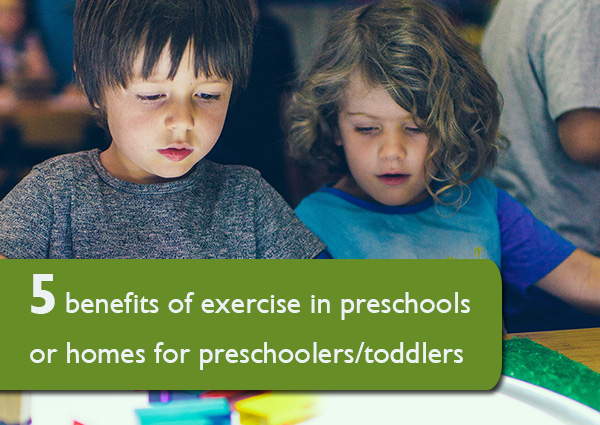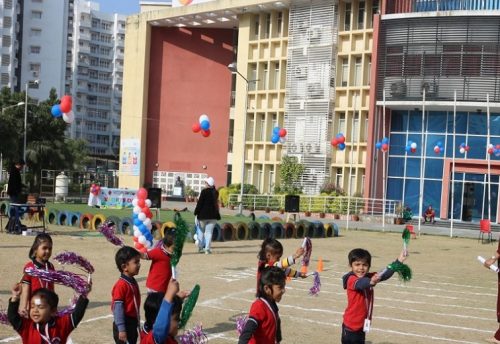
5 Benefits of Exercise in Preschools
5 Benefits of Exercise in Preschools
In this article, you will learn about 5 benefits of Exercise in Preschools. So, if exercise is so important, that leaves many parents wondering when they should get started with their kids. Do you need to sign your toddler up for gymnastics already? Is your preschooler behind if he isn’t in soccer or dance already? Of course not, but it is still important that toddlers and preschoolers get some exercise.
Preschoolers need a little exercise, at least 60 minutes of structured physical activity and at least 60 minutes of unstructured physical activity each day. Again, these are minimum recommendations and preschoolers should also be physically active for several hours each day and shouldn’t be sedentary for more than 60 minutes at a time unless they are sleeping. Your child learns the most about healthy active living from you. Include the whole family in regular physical activity and healthy eating. It’s easier if families do things together as part of the daily routine.Regarding this Best Daycare franchise in India will do a great job.
• Choose activities that suit your child’s age and stage of development.
• Give your child lots of time to be active in both structured activities, like organized sports, and unstructured activities, like playing in a playground.
• Keep activities fun.
Why Should Children Exercise
• Children who are active 60 minutes per day demonstrate lower rates of Obesity.
• Greater rates of activity in children have been associated with higher test scores in reading and math.
• Physical (body) and cognitive (brain) development go hand-in-hand. While this continues for life, this relationship is most critical at a young age. When kids are active, their brain develops, allowing for new types of activity.
• Improves posture. Poor posture in children can result in fatigue, back and neck pain and headaches. Children who have spines that are out of alignment or deformed due to chronic slouching are less developed in physical coordination and as a result cognitive coordination.
• Frequent activities requiring a high degree of balance and coordination have been associated with the improved emotional response.
• Frequent exercise decreases symptoms of depression and anxiety in children.
• Regular exercise with children promotes self-efficacy with regard to health and self-image.
• Provides opportunities to develop social skills and make friends. Exercising in a group, especially engaging in a team sport provides a chance for a child to make new friends and work as a team.
Here are 5 benefits of exercise in preschools or homes for Preschoolers/toddlers:
1. It Controls Weight

When a person is sedentary, he tends to be taking in more calories than are needed. These unused calories accumulate as fat. A person who is physically active may have a deficit of calories, which takes fat away and lowers weight. Lowered weight is good for the heart and can be beneficial in people with diabetes.
2. It Enhances Emotional Well-Being.

Most people report that they feel calm and have a sense of well-being after they exercise. Exercise, according to one theory, releases beta-endorphin, a natural substance in the body that is hundreds of times more potent than morphine. Another theory points to serotonin as the cause of the exercise high. Increased levels of serotonin in the central nervous system are associated with feelings of well-being, heightening of appetite, and lessening of mental depression. The weight loss that accompanies exercise can also cause people to feel better about themselves.
3. It Is Good for Your Child’s Muscles and Bones

Exercise plays a vital role in building and maintaining strong muscles and bones. Physical activity like weight lifting can stimulate muscle building when paired with adequate protein intake. This is because exercise helps release hormones that promote the ability of your child’s muscles to absorb amino acids. This helps them grow and reduces their breakdown. Practicing regular physical activity is essential to reducing muscle loss and maintaining strength as your child ages. Children who exercise have been shown to have a higher bone density than children who don’t.
4. Exercise Improves Mental Health

Exercise enhances the brain’s metabolism. Studies show that active children have improved memory as a result of better brain function. Moderate, fun-oriented exercise literally burns off excess harmful hormones and, at the same time, increases the release of beneficial ones. One of the beneficial hormones acts as a neurotransmitter for establishing new memories. Active children have the ability to concentrate much better, even at the end of a long school day. Studies report that exercise decreases anxiety reduces depression, and improves mood and outlook in children. In addition, their quality of sleep is improved.
5. It Regulates Blood Pressure and Improves Energy Levels

Exercise has been shown to reduce stress levels. As the levels of stress in a person’s body subsides, his blood pressure and his risk for heart disease decline. Regular exercise often makes people feel more energetic, allows them to be more active, and reduces the likelihood that they’ll tire during the day.
If You Are Looking For Play School Franchise





Leave a Reply